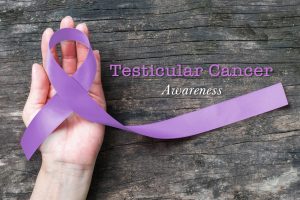April is Testicular Cancer Awareness Month. This month-long observance spotlights the disease and emphasizes the importance of understanding the risks and warning signs of it.
Testicular Cancer is the most common cancer in men ages 15-34, with an estimated 10,000 cases diagnosed in the United States every year. Testicular cancer, which can develop in one or both testicles, occurs when sexual reproductive cells called germ cells experience abnormal growth. If germ cells become cancerous, they multiply, forming a mass of cells called tumors that begin to invade normal tissue. If not treated, they can spread rapidly to other parts of the body including to the abdomen, liver, lungs, bones and brain.
Regular testing by your physician and conducting monthly self-examinations of the testes is important for early detection. Since testicular cancer is usually isolated to a single testicle, comparing your testicles with one another for abnormalities can be helpful. It is important to know that it is normal for one testicle to be slightly larger than the other so your focus during a self-exam should be on other differences between the testes as well as changes from the previous month. In addition to self-exams, all men should have their primary care physician check their testicles as part of their annual physical.
The warning signs of testicular cancer include:
- A lump of any size on the testicle
- Enlargement of the testicle, change in shape, size or any irregularities
- Pain or discomfort in the scrotum or testicle
- A dull ache or sense of pressure in the lower abdomen or back
- A feeling of heaviness or fullness in the scrotum
- Enlargement or tenderness of the breasts due to elevated hormone levels
In most cases early stages of testicular cancer present themselves in a completely painless manner. If any of these symptoms are present, you need to see your doctor for further testing immediately.
By raising awareness during the month of April, we can empower individuals to learn more about testicular cancer and educate men about the importance of early detection.
To make an appointment with a doctor at Flushing Hospital, please call 718-670-5486.
All content of this newsletter is intended for general information purposes only and is not intended or implied to be a substitute for professional medical advice, diagnosis or treatment. Please consult a medical professional before adopting any of the suggestions on this page. You must never disregard professional medical advice or delay seeking medical treatment based upon any content of this newsletter. PROMPTLY CONSULT YOUR PHYSICIAN OR CALL 911 IF YOU BELIEVE YOU HAVE A MEDICAL EMERGENCY.

